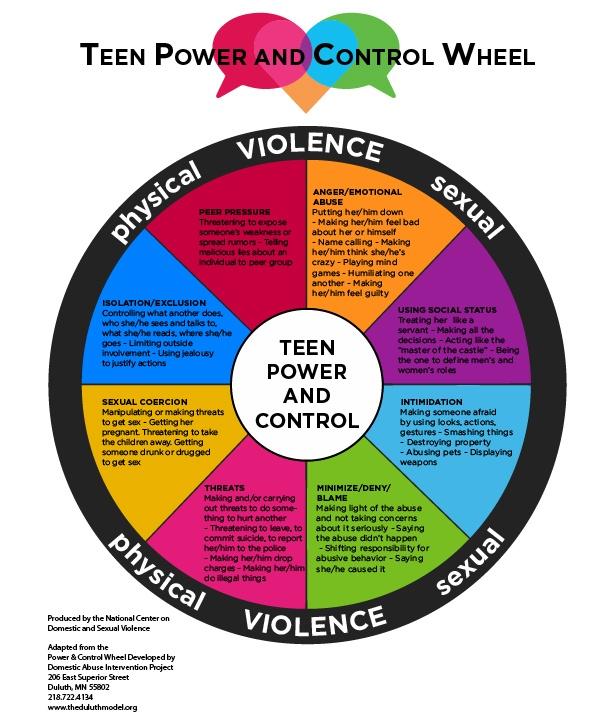
Reach out for free, confidential support from trained advocates at the Family Justice Center - 716.558.7223
If you have a friend who might be at risk, it’s important to reach out. Learn how to identify the red flags and warning signs of abuse and explore effective ways to begin the conversation with someone you think might be in an abusive relationship.
Relationship abuse is more common than you think. One in three teenagers experience some form of relationship abuse from the people they are dating.
Only 33% of teens who have been in or known about an abusive relationship ever tell someone about it. It may surprise you that 16-24 year olds experience the highest rates of intimate partner violence—three times the national average.
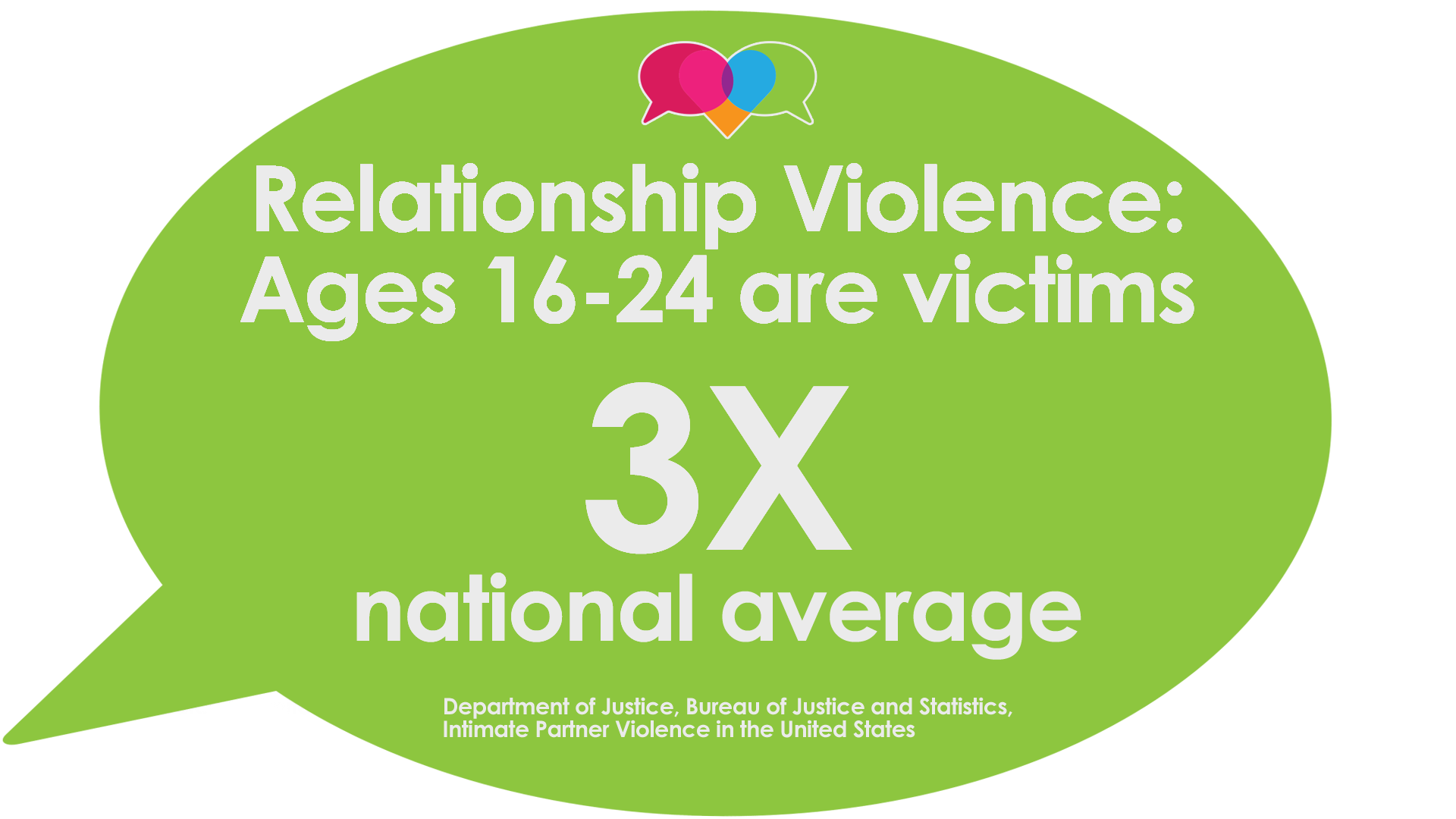
Relationship abuse is a pattern of behaviors including physical, mental, sexual, emotional, digital and/or verbal abuse used to gain power and control over a partner. The abuse can happen over time and may continue to get worse.
Many teens and young adults do not report it because they are afraid to tell friends or family and aren’t sure where to turn for help.
The most important thing you can do is be supportive and let them know that help is available when they are ready to reach out.
What Do I Need To Know?
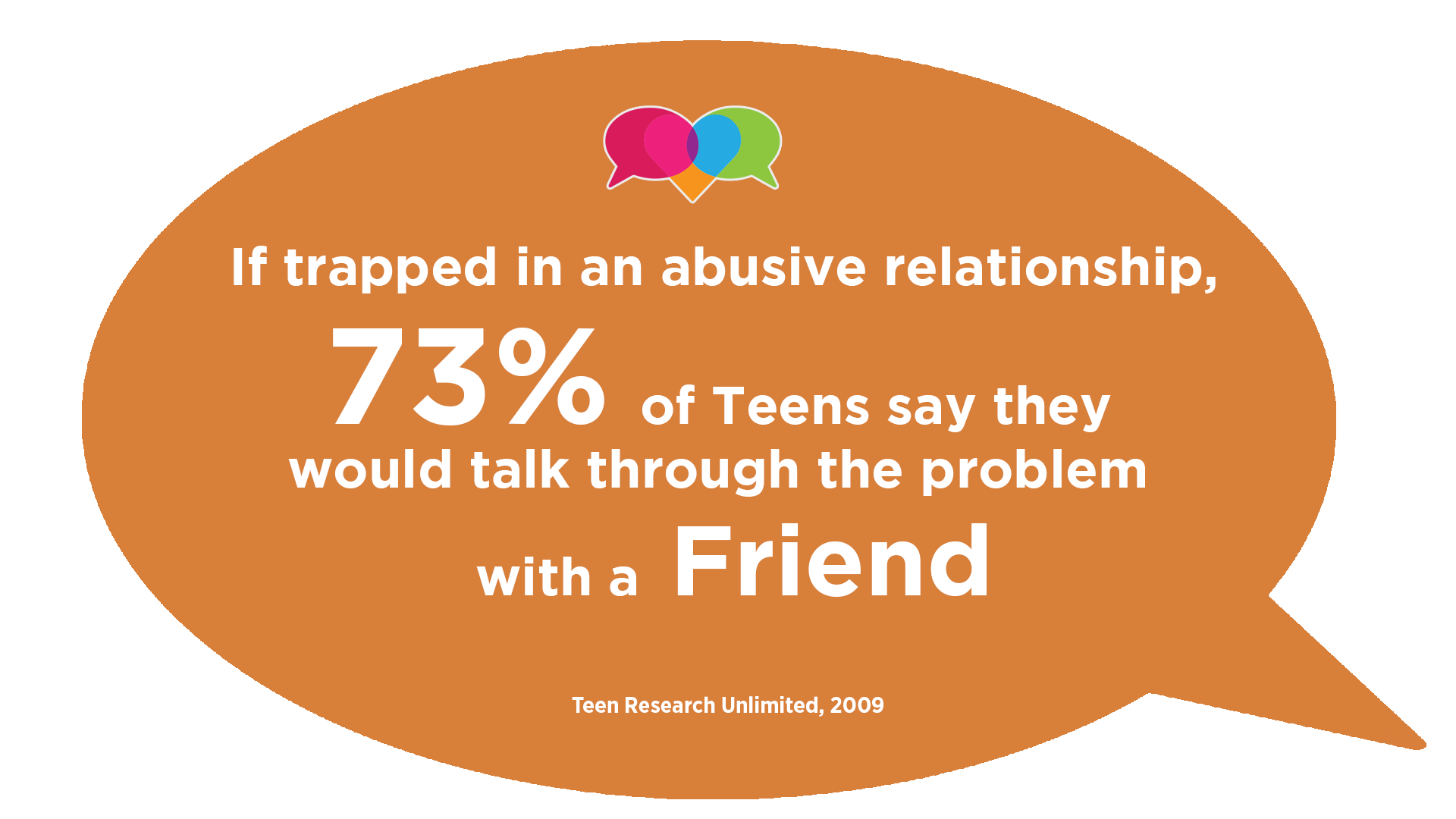
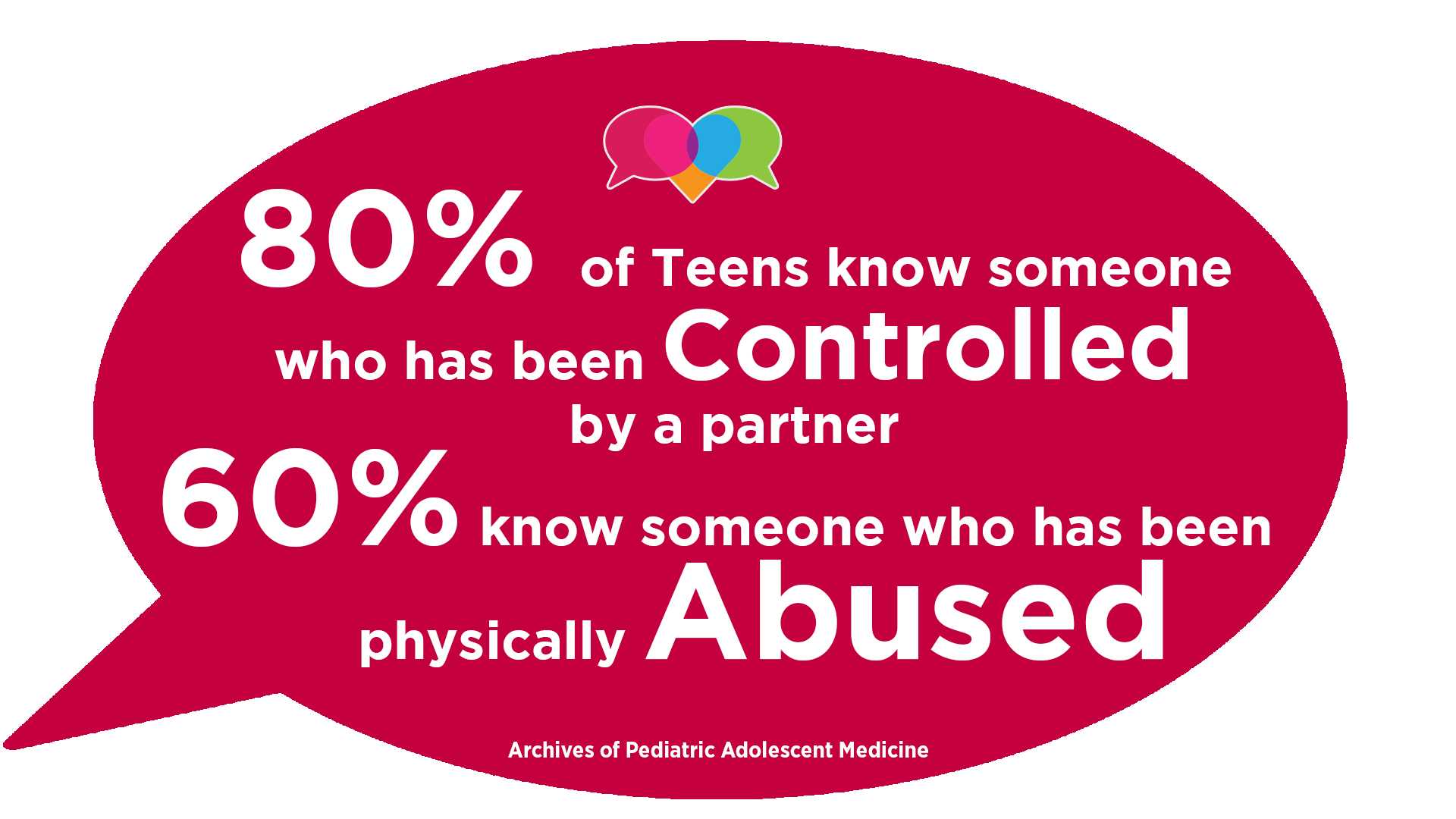
Statistics like these show us that relationship abuse is a startlingly common phenomenon, affecting people of all ages, races, nationalities, genders, religions, and socioeconomic groups. It also occurs in same-sex relationships. One in three . . . think about that. It means that you personally know and come into contact with people in your life who are experiencing abuse.
It’s a mistake to assume that it’s not your place to speak up. But studies show that friends are the primary listening posts- more common than Mom and Dad combined. If trapped in an abusive relationship, the majority of teens (73%) said they would talk through the problem with friends. Only 54% said they would reach out to their parents.
It’s important to know that teen relationship abuse can be as violent as adult domestic violence. Teens and young adults who experience or perpetrate abuse in their dating relationships are very likely establishing patterns of abuse that can carry on throughout their adult lives.
It can definitely be scary and overwhelming to consider the prevalence of relationship abuse in your peer group, and even harder to watch a friend live through a painful and even dangerous relationship.
If you’re not sure how to help, it isn’t easy, but it’s too important to ignore.
How to Recognize Unhealthy Relationships
Navigating through relationships as a teen or young adult years can be challenging. Being able to tell the difference between healthy, unhealthy and abusive relationships can be more difficult than you would think. Healthy relationships require hard work, communication and a few good relationships that can serve as role models.
Not sure if someone you know is in trouble? You might not see dramatic warning signs like a black eye or broken bone, so it can be difficult to know for sure if your friend is experiencing abuse. In fact, abuse doesn’t start overnight. At the beginning they may have seemed like the perfect couple. Gradually the warning signs and red flags appear. Often, so gradually, the victim doesn’t even realize it is happening.
But if you know the signs to look for, you might be able to recognize an abusive relationship before it becomes dangerous. To start, listen to your instincts- you probably wouldn’t be worried without good reason.
Although there are many signs to pay attention to when it comes to relationships, look for these common red flags and warning signs of relationship abuse.
Warning Signs and Red Flags
 When you see them together, their boyfriend/girlfriend calls them names, belittles or puts them down in front of others
When you see them together, their boyfriend/girlfriend calls them names, belittles or puts them down in front of others
 They are constantly worried about making their partner angry
They are constantly worried about making their partner angry
 Lack of interest in former extracurricular activities
Lack of interest in former extracurricular activities
 They stop spending time with friends and family and become more isolated
They stop spending time with friends and family and become more isolated
 They are depressed or anxious, or you notice changes in their personality
They are depressed or anxious, or you notice changes in their personality
 Little social contact with anyone but their partner
Little social contact with anyone but their partner
 They have unexplained marks or injuries, or the explanations they offer don't make sense
They have unexplained marks or injuries, or the explanations they offer don't make sense
 Apologizes for their partner’s behavior and makes excuses for their partner’s inappropriate behavior
Apologizes for their partner’s behavior and makes excuses for their partner’s inappropriate behavior
 Partner acts extremely possessive, jealous of others
Partner acts extremely possessive, jealous of others
 Partner checking up on them constantly, calling and texting them
Partner checking up on them constantly, calling and texting them
 Partner checks cell phones, emails or social networks without permission
Partner checks cell phones, emails or social networks without permission
 They casually mention his or her violent behavior or explosive temper, but laugh it off as a joke
They casually mention his or her violent behavior or explosive temper, but laugh it off as a joke
 You see their partner lose their temper, striking or breaking objects
You see their partner lose their temper, striking or breaking objects
 You see signs of unhealthy behavior when the abuser thinks no one is paying attention
You see signs of unhealthy behavior when the abuser thinks no one is paying attention
 They change appearance at the request of their girlfriend/boyfriend
They change appearance at the request of their girlfriend/boyfriend
While they might not come to you directly, you are in a unique position to see the warning signs and red flags.
Power and Control
Every relationship is different, but the things that unhealthy and abusive relationships have in common are issues of power and control. Violent words and actions are tools an abusive partner uses to gain and maintain power and control over their partner.
What Does Relationship Abuse Look Like for Teens and Young Adults?
Physical Abuse: Any intentional use of physical force with the intent to cause fear or injury, like hitting, shoving, biting, strangling, kicking or using a weapon.
Verbal or Emotional Abuse: Non-physical behaviors such as threats, insults, constant monitoring, humiliation, intimidation, isolation or stalking.
Sexual Abuse: Any action that impacts a person’s ability to control their sexual activity or the circumstances in which sexual activity occurs, including rape, coercion or restricting access to birth control.
Digital Abuse: Use of technology and/or social media networking to intimidate, harass or threaten a current or ex-dating partner such as demanding passwords, checking cell phones, cyberbullying, non-consensual sexting, excessive or threatening texts or stalking on social media.
Stalking: Being repeatedly watched, followed, monitored or harassed. Stalking can occur online or in person, and may or may not include giving unwanted gifts.
Financial Abuse: Exerting power and control over a partner through their finances, including taking or withholding money from a partner, or prohibiting a partner from earning, or spending their money.
Relationship abuse . . .
…is a pattern of behaviors, not a single event or an isolated incident.
…will escalate over time. Relationships do not start off as abusive, and abuse can happen at a very slow pace. Little by little and sometimes very slowly, a relationship goes from healthy to unhealthy to abusive.
… comes in cycles. Even abusive relationships will have positive aspects and good times. Tension builds, escalates into an incident, and then there are often peaceful periods where the abuser apologizes and promises to change. However, the abuse will always return and will become more severe.
…is intentional. For a relationship to be abusive, one partner deliberately gains and maintains power and control over the victim. It is intentional, and the abuser is actively trying to change the victim’s behavior. When the victim doesn’t do what the abuser wants, the abuser will punish him or her. This punishment could range from verbal (like yelling or insulting) to physical. The victim will change his or her behavior to avoid punishment and accommodate the abuser.
What Can I Do?
You can play an important role in helping your friend recognize abuse and get the help they need. They are likely hiding the situation from their parents, but may be more open away from home. If you recognize the signs, take action.
The only way to know for sure if someone is being abused is to talk to them. If you think a friend may be in an unhealthy relationship, having a conversation with them about it is crucial. Express your concern, be supportive and remind them that help is available.
Your next steps should be taken with care and caution – here’s why. You can easily make the situation worse!
Your instinct may be to try to save them or tell them to end the relationship, but it is not that easy. They must make their own decisions.
Keep in mind that relationship abuse is all about power and control. Any attempt to swoop in and make demands could backfire and make them shut down or may even put them in greater danger.
How to prepare:
Finding the right moment to talk about abuse can seem like a daunting task. Find a private space where you can talk, away from friends, teachers or anyone else that might overhear you. Have the conversation in a quiet and private space, and allow enough time to listen.
Keep it low key. Don’t push it if they are not ready to talk. Try again another time.
Remember to not judge, blame, shame or jump to conclusions. Your conversation should come from a place of concern for their well-being. Help them see their value and potential, independent of this relationship.
Understand you are starting the conversation. The goal is to keep communication open. This is not a one-time conversation. Ask questions and make sure they know you are there for them.
What to do/say:
Privacy and confidentiality are key. Let them know that whatever you talk about will stay between the two of you. This is the only way you'll build their trust and keep that door open. If someone overhears you talking, rumors can start and that can be dangerous.
Be supportive and listen. Abusive partners will often try to isolate the victim from family and friends so they can have total power and control without any interference. Remember they may not recognize the abuse or even want to leave or stop. This is difficult when you clearly see the signs.
Try to listen without judgment. Try not to speak negatively about the abusive partner. This may put the victim on the defense, because they have already been manipulated to believe that the abuse is their fault. Alternatively, they may feel embarrassed or ashamed that they “allowed” the abuse to happen.
Start the conversation with questions like "How are things going?,” or “It seems like you’re stressed out or unhappy. I’m here if you want to talk about it now or some other time, I’ll keep it between us.”
Keep it simple. Talk about behaviors or red flags you've seen. Tell them you have noticed certain things that concern you. “How do you feel when he is calling you all the time?” or “I’m concerned that he seems to control where you are allowed to go and who you talk to.” Ask them if they have noticed the same and how that behavior makes them feel. Tell them about specific times you have been worried about them. “I was scared for you when I saw him grab your arm. Have you thought about talking to someone about what you are going through?” Point out that what's happening isn't "normal." Everyone deserves a healthy and safe relationship.
Listen and believe them. Say things like, “I’m sorry this is happening to you,” “I know it’s complicated,” “It’s not your fault” and “You don’t deserve this.” Make it clear that you don’t blame them and that you respect their choices. They may be reluctant to share their experiences in fear of no one believing what they say.
Reflect their own power and control back to them while showing your support. Say something like, “Here are resources when you’re ready. I encourage you to make that call, but I want you to know that this is your situation and you know what is best for you. Is there anything I can do to help?”
What you see or hear may make you frustrated and upset. If this happens try to stay calm. Remind them that she or he deserves a healthy violence-free relationship and that they didn't cause this, abuse is NEVER appropriate and NEVER their fault.
Focus on them, not their abuser. Even if they stay with their partner, it’s important they still feel comfortable talking to you about it.
Listen, but acknowledge that you are not an expert. Empower them with the tools to act when they’re ready. Encourage them to reach out and connect with resources in the community like the Family Justice Center which offers confidential help, information and guidance from trained advocates. Stress that you respect their decision and a resource is available for them that will do the same and they have the expertise to help young people in this situation.
Be prepared. The initial conversation might not go as smoothly as planned. They may put up barriers or deny there is even a problem.
Be patient. On average, it takes domestic violence survivors seven times to leave the relationship for good. Continue offering support in any way you can. Believing and supporting them can be a major factor in helping them stay safe or helping them find their own way to end their unhealthy relationship when they’re ready. Let them know that you will be there for them no matter what.
What NOT to do/say:
- Don’t try to control the situation. Threatening to report the abusive behavior might shut them down.
- Do not try to fix this by going to their partner, family or other friends. That can inflame the situation. You want to build their trust.
- Don't blame or judge. Don’t make them feel like they brought this on. They already get “blame” in their current unhealthy relationship. They did not cause this. It's not their fault. Be careful about this, because you can show judgement in your body language.
- Don't make demands or offer advice. Offer suggestions or options and then respect their decision. Never start a sentence with "You should" or "You shouldn't.” Keep in mind that relationship abuse is all about power and control. Any attempt to swoop in and make demands could backfire and make them shut down. Instead, you can help shift power back to them by trusting that they know their situation best, and letting them know you are there to provide help and support.
- Don't wait for them to come to you. You are in a unique position to see certain warning signs and red flags.
- Don't try to fix this by yourself. There are people who are trained and see this every day. Find resources and people who can help not just the victim, but you too.
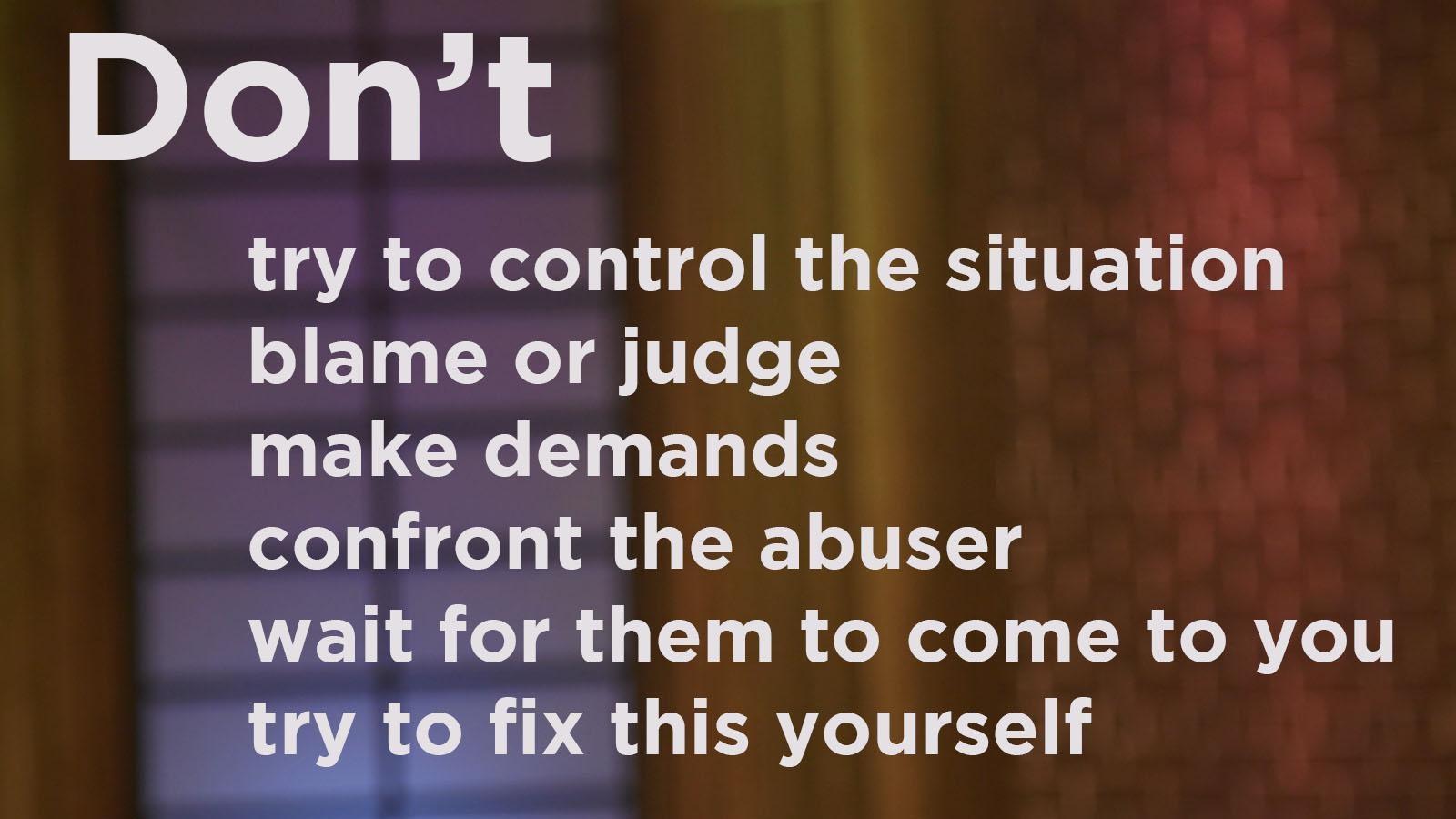
Staying quiet could have dire consequences. It’s too important to ignore. It literally could save their life. Even when you feel like there’s nothing you can do, don’t forget that by being supportive and caring, you’re already doing a lot.
Need More Support? | Reach Out
If your friend isn't ready to openly communicate with you about his or her relationship, let them know there are free, confidential services and trained individuals available to answer questions and help avoid unhealthy relationships. Pass on the information below, but let them know you are always available to talk.
If at any time you feel that you or your friend are in immediate danger, call 911.
